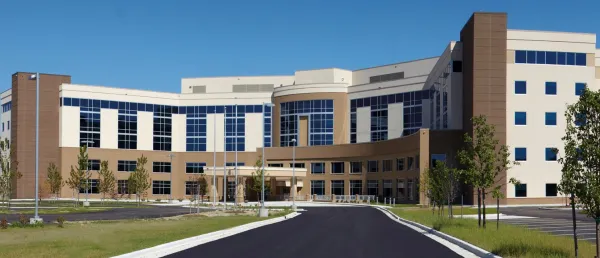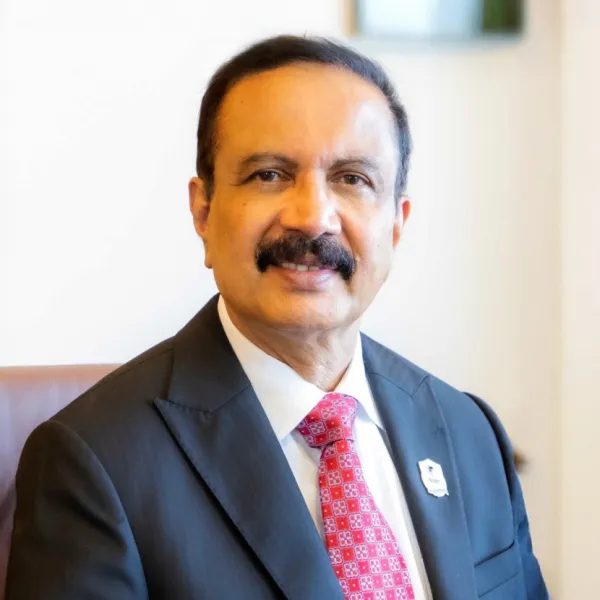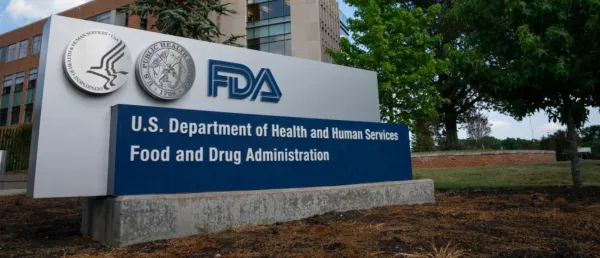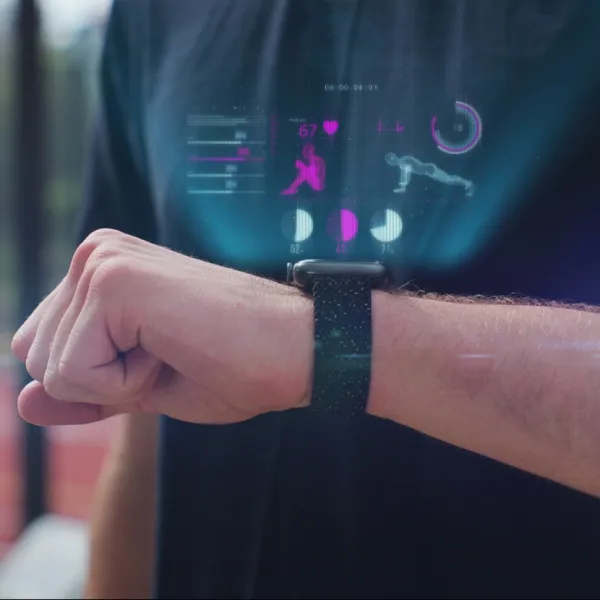How AI Redefining Healthcare Delivery with Speed, Accuracy & Convenience: A Case Study

Using AI to revolutionize traditional practices and enhance patient care, Indian hospitals have emerged as trailblazers in advanced healthcare technology.
India is witnessing a significant surge in AI-driven healthcare applications, from diagnosis to treatment and beyond.
According to recent statistics from IndiaAI, the Indian healthcare Artificial Intelligence (AI) market is expected to reach $1.6 billion by 2025, with a CAGR of 40.5% from 2020 to 2025.
Additionally, the World Economic Forum anticipates AI expenditure in India to reach $11.78 billion by 2025, potentially contributing $1 trillion to India's economy by 2035.
AI Transforming Healthcare
AI is reshaping healthcare in India, streamlining tasks and processes through automation. From analyzing medical images to offering diagnosis and treatment suggestions, AI is revolutionizing healthcare delivery.
Additionally, AI paves the way for personalized medicine, ensuring better patient outcomes. As technology continues to advance, the future holds even greater potential for AI to address specific healthcare needs with tailored solutions.
The integration of AI into Indian healthcare holds immense promise, offering a myriad of benefits that transcend traditional healthcare paradigms. By harnessing AI-driven solutions, healthcare stakeholders can enhance patient outcomes. Providing personalized care and improving treatment effectiveness. Automating administrative tasks and medical processes boosts efficiency and productivity, allowing healthcare organizations to operate more effectively.
Additionally, AI's optimization of resource utilization and facilitation of early disease detection has the potential to lower healthcare costs and improve cost-effectiveness.
Moreover, AI expands access to care by providing decision support and guidance to patients and healthcare providers, empowering individuals to make informed decisions about their health.
Hospitals Harnessing AI to Meet Healthcare Needs
Venturing into the realm where healthcare converges with advanced technology, Indian hospitals emerge as trailblazers in leveraging AI to revolutionize traditional practices and enhance patient well-being.
Listed below are case studies of top Indian hospitals that have brought changes using AI in offering healthcare services.
Max Healthcare: Optimizing Patient Care with AI
Speaking exclusively to DHN, Prashant Singh, director & CIO, Max Healthcare, emphasized the pivotal role of AI in transforming healthcare delivery.
According to him, "AI technologies offer unparalleled potential to enhance diagnostic accuracy and streamline treatment processes, ultimately improving patient outcomes."
Singh highlighted that by harnessing AI technologies, Max Healthcare integrates automated image processing for medical imaging interpretation, enabling early detection of neurological diseases, brain tumors, strokes, and fractures. This enhances diagnostic accuracy and facilitates timely interventions, ultimately improving patient outcomes.
Max Healthcare's AI initiatives include:
Medical Imaging Advancements: By integrating AI into medical imaging interpretation, Max Healthcare has enabled automated analysis of X-Rays, MRIs, and CT scans. This has significantly improved diagnostic accuracy, enabling early detection of neurological diseases, brain tumors, strokes, and fractures.
Personalized Treatment Plans: Leveraging AI-driven predictive analytics, Max Healthcare tailors treatment plans based on individual patient data. The hospital predicts health outcomes through ML algorithms, identifies at-risk populations, and personalizes interventions, thus enhancing patient care and reducing healthcare costs.
Operational Efficiency Enhancements: Max Healthcare harnesses AI to automate administrative tasks and implement innovative healthcare simulation and training programs.
The hospital has streamlined clinical documentation processes and improved patient engagement with AI-powered natural language processing and remote patient monitoring technologies.
Aster DM Healthcare: AI for Personalized Treatment
Echoing similar sentiments, Dr Nitish Shetty, CEO, Aster DM Healthcare, underscored AI's transformative potential in healthcare.
Sharing insight with DHN, the CEO said, "AI technologies enable faster diagnoses, personalized treatment plans, and bridge the gap between clinical expertise and technological advancements."
The following are some of Aster DM Healthcare's initiatives in AI:
AI-Empowered Diagnostics: Aster DM Healthcare utilizes AI to analyze vast datasets, predict outcomes, and support clinical decision-making. Through collaborations with academic institutions like the Indian Institute of Science (IISc), the hospital has developed cutting-edge tools for neurology and other clinical specialties, facilitating quicker diagnoses and personalized treatment plans.
Precision Medicine Solutions: One such initiative, according to Shetty, is Aster DM Healthcare's AI Carpal Tunnel Syndrome detection tool, which offers efficient nerve ultrasound diagnostics. These innovations enhance diagnostic accuracy and treatment effectiveness, marking significant strides toward healthcare excellence.
Future Vision & Collaboration: Driven by a vision of inclusive healthcare, Aster DM Healthcare envisions a future where AI-driven solutions bridge gaps in access and quality care.
Dr Shetty added that by collaborating with academic institutions such as the Indian Institute of Science (IISc), Aster DM Healthcare pioneers cutting-edge tools for neurology and other clinical specialties.
These AI-driven solutions enable quicker diagnoses and personalized treatment plans and bridge the gap between clinical medicine and technology, ensuring equitable access to quality care.
AIIMS Delhi: iOncology.ai for Cancer Diagnosis
The iOncology.ai platform, developed by a collaborative effort between the All India Institute of Medical Sciences (AIIMS) and the Centre for Development of Advanced Computing (C-DAC), Pune, represents a significant advancement in cancer diagnostics and therapeutics.
Sharing insights, Dr SK Meher, CIO, AIIMS, Delhi, said, "The AI models in the iOncology.ai platform have been tested on 1500 breast and ovarian cancer patients from AIIMS and were found to be over 75 percent accurate when compared to the diagnosis provided by the clinicians."
This groundbreaking tool integrates AI with expertise from diverse fields such as molecular oncology, surgical oncology, data science, and IT, revolutionizing the fight against breast and ovarian cancers.
Furthermore, the platform's potential extends beyond diagnosis, as highlighted by Meher.
"The platform allows doctors to store cancer patient's demographic, clinical, and non-clinical data, such as blood tests, lab reports, radiological scans, and their follow-up history," added Meher.
With modules dedicated to organization, case management, and AI modeling, iOncology.ai offers clinicians personalized treatment plans, early detection and diagnosis capabilities, streamlined data integration and analysis, improved clinical workflow efficiency, outcome prediction, and continuous learning and improvement.
This comprehensive approach, combined with its installation in district hospitals across multiple Indian states, underscores its role in addressing the patient burden on hospitals and improving cancer care nationwide.
Avisa Hospitals: Harnessing AI for Streamlining Operations
Outlining Avisa Hospital's approach with DHN, Vikash Sharma, CEO, Avisa Hospitals, highlighted AI's role in enhancing patient care and operational efficiency.
Sharma stated, "AI-driven technologies empower clinicians, streamline operations, and foster continuous improvement, ultimately enhancing healthcare delivery."
The hospital's AI initiatives include:
AI-Driven Patient Care: Avisa Hospitals leverages AI algorithms for accurate diagnosis, personalized medicine, and predictive analytics. These technologies empower clinicians to deliver timely interventions, enhance patient outcomes, and reduce healthcare costs through proactive care measures.
Operational Streamlining: Automating administrative tasks, scheduling, patient admissions, and inventory management through AI-driven solutions has significantly improved efficiency at Avisa Hospitals.
Further, AI enhances the overall patient experience and facilitates seamless healthcare delivery by reducing manual errors and optimizing resource allocation.
Continuous Improvement Culture: Avisa Hospitals fosters a culture of continuous learning and innovation, utilizing AI for resource allocation optimization and quality improvement initiatives.
These efforts ensure that patients receive the highest standard of care while driving operational excellence and cost-effectiveness.
Apollo Hospitals: Accelerating Diagnosis & Predictive Analysis with AI
In a previous interview with TheWeek, Suneeta Reddy, MD of Apollo Hospitals, envisions a future where AI-driven solutions transform healthcare delivery.
Reddy said, "AI technologies hold the potential to accelerate diagnoses, predict diseases, and ensure equitable access to quality care, driving meaningful change in the healthcare landscape."
Apollo Hospitals' AI-driven initiatives include:
Predictive Cardiac Risk Score: Collaborating with Microsoft, Apollo Hospitals developed the AICVD algorithm, offering personalized risk assessment for cardiac diseases. Virtual reality technologies empower individuals to observe their heart's health, driving preventive healthcare initiatives.
Innovative AI Solutions: Apollo Hospitals pioneers AI solutions for disease prediction and prevention, leveraging longitudinal patient journeys to develop risk scores for diabetes and chronic kidney disease.
AI-Precision Oncology Centre: Apollo Cancer Centre recently unveiled the AI-Precision Oncology Centre (POC) in Bengaluru, setting a new standard in cancer care. The AI-POC offers specialized medical services ensuring accurate diagnosis, real-time insights, cancer risk assessment, treatment protocols, and a seamless continuum of care.
Fortis Hospital: Advancing Precision Healthcare with AI
Discussing the same, Mohit Singh, zonal director, Fortis Hospital Noida, highlighted AI's significance in addressing non-communicable diseases (NCDs).
According to him, "AI-powered technologies enable precision-based interventions, enhancing patient outcomes and addressing the growing burden of non-communicable diseases."
Among Fortis Hospital's AI initiatives are:
AI-Powered Cath Lab: Fortis Hospital Noida recently introduced the state's inaugural AI-powered cath lab, incorporating cutting-edge technologies for precision-based interventions in cardiac-related ailments. This AI-powered cath lab enhances diagnostic accuracy and treatment efficacy, revolutionizing precision healthcare delivery.
Addressing Healthcare Challenges: AI-driven technologies at Fortis Hospital Noida enable early disease detection, personalized treatment plans, and precision interventions. These innovations improve patient outcomes, reduce treatment costs, and enhance healthcare delivery.
Wrapping Up
As India's healthcare sector continues to evolve, the integration of AI emerges as a pivotal force driving transformative change.
With top hospitals and innovative startups at the forefront of AI adoption, the landscape of healthcare delivery is being reshaped, promising improved patient outcomes, enhanced operational efficiency, and cost-effectiveness.
As these institutions harness the power of AI to revolutionize diagnostics, treatment, and operational processes, the future of Indian healthcare shines bright with the promise of innovation and excellence.
Stay tuned for more such updates on Digital Health News





























